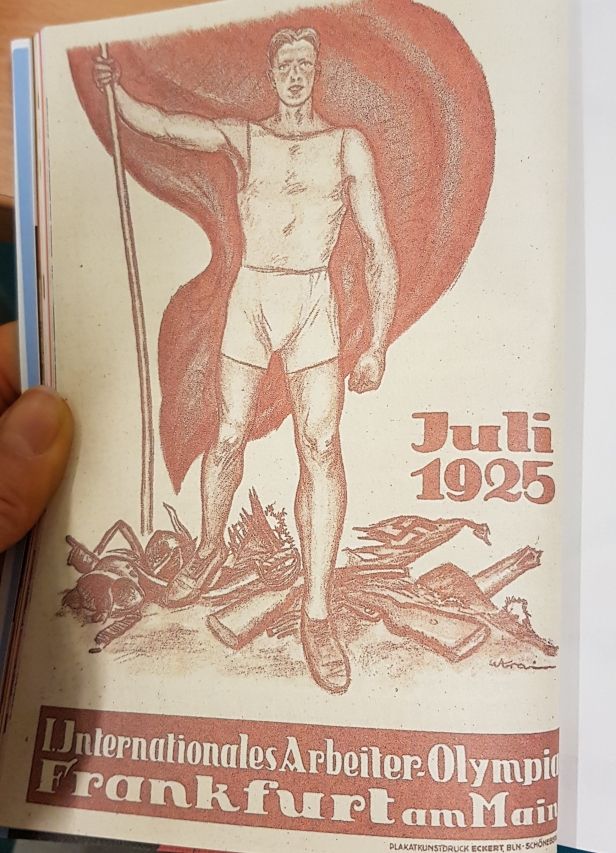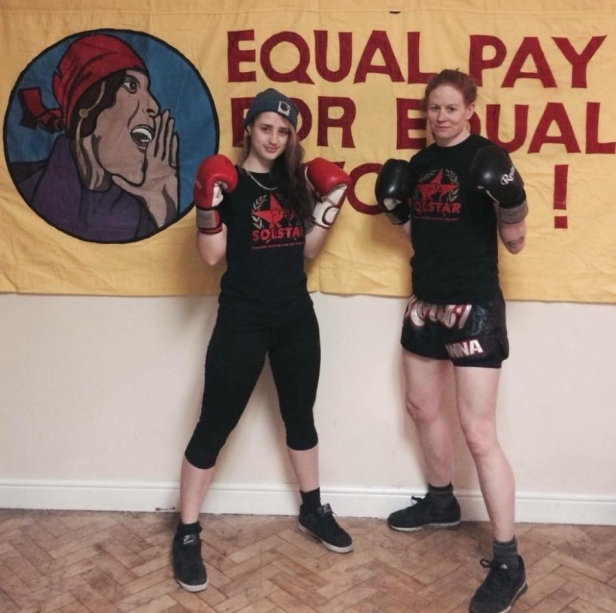This post is part two in a series where I explain the background to a union sports project that I tried to bring into reality, between 2016-2018. Catch up with part one here first if you missed it.
Part three will look at what might be the future of this idea. But first, here’s the past which it draws from.
—
The following graphics are (mostly) taken from the book ‘Playing as if the World Mattered’: An illustrated history of activism in sports by Gabriel Kuhn. The first part of the book documents workers’ sport and union sport. Unfortunately this section is very European-focused, but later sections have examples from around the world and cover sport’s role in the struggle against fascism, segregation, apartheid and more.

Poster for the ‘First National Gymnastics Festival’ in 1924, organised by the Workers’ Gymnastics and Sports Association of Czechoslovakia.

The Free Female Gymnast (top) was a journal published by the Worker Gymnasts Association in Germany between 1908-1926. I bet you thought you weren’t interested in union sports, until you saw it illustrated by this proud vintage naked woman. The bottom is a postcard from the same organisation in the early 1900s.

Cover of the pamphlet ‘Women’s Gymnastics: Play and Sport’, published by the ‘Workers’ Gymnastics Press A.B. Leipzig’.

Cover of the ‘German Workers’ Chess Journal’ no. 1, Jan 1914. The poem reads: ‘He who loves logic and imagination / And he who enjoys thinking / Shall direct his steps toward us / For a game of chess.’

Postcard by the ‘Worker Cyclists Association ‘Solidarity’’, early 1900s. This organisation peaked at 300,000 members in the 1920s, maintaining its own bike factory, workshops, inns, cottages and insurance systems.

Poster announcing the ‘First International Workers’ Olympics’ in Frankfurt, Germany, 1925. On the ground are smashed weapons and a torn Nazi flag.

Cover of the guidebook to the ‘Second Workers’ Olympics’ in Vienna, Austria, 1931.

Poster for the 1936 People’s Olympics in Barcelona. This was organised as an alternative to the Berlin Games that same year. Six thousand athletes, many from workers’ sports organisations, arrived to take part, but the day before the opening ceremony General Franco began his coup on the republic and the Games were cancelled. Some athletes stayed to join the International Brigades.

Poster for the ‘Third Workers’ Olympics’ in Antwerp, Belgium, 1937.

Cover of ‘The Fighter’ no. 1-2, 1933, an Austrian journal for workers’ sports and antifascism. ‘Blick zum Ziel’ roughly means ‘Eyes set on the goal’.

This 1936 Labour Athletics carnival was organised by the Jewish Labor Committee to counter the World Olympics Nazi Germany hosted in Berlin as a showcase of fascist strength. As fascists seized power in Europe, New York City unionists mobilised against them on the home front. The Jewish Labor Committee, founded in 1934 by the needle trade unions, the Arbeiter Ring (Workmen’s Circle) fraternal organisation, and the Jewish Daily Forward, worked tirelessly to educate Americans about the dangers of Nazi power and to save the lives of its intended victims.
80 years later, this poster was my direct inspiration for the UNISON Regional Games.

Also from around 1936, a photo of the anti-fascist Stepney Workers Sports Club in the Jewish East End of London. I would love to read the whole of that slogan on the bottom of the banner.

Talking of banners, this is a slogan featured on one of my all time favourites, the banner of the Transport & General Workers Union power and engineering Birmingham district committee. Year unknown.

IWW basketball team, 1940

Easton Cowgirls netball team recruitment poster, 2011. This team is part of the Easton Cowboys & Cowgirls community sports club from Bristol. They were guests at the 2018 UNISON West Midlands Regional Games.

Here’s where our contribution to this history begins – the poster for the first UNISON West Midlands Regional Games in 2016.

Poster for the second UNISON West Midlands Regional Games in 2017.

Poster for the third UNISON West Midlands Regional Games in 2018. We downscaled to a smaller venue.


AFC Unity are a pro-union community-focused women’s football team from Sheffield. They were guests at the third UNISON West Midlands Regional Games in 2018.
Explicitly union-backed sports are a rare thing these days… but not unheard of.





Solstar a London-based women-led boxing and martial arts club, in front of an Equal Pay for Equal Work banner.
https://www.footballtradedirectory.com/port-vale-announce-union-gmb-as-new
With the far right rising in confidence once more, as we saw in the early 20th century, the big difference is that trade unions are unknown to most young workers in 2019.
Unions can find a renewed footing in communities by turning back to our own history of bringing people together as equals through sport.
